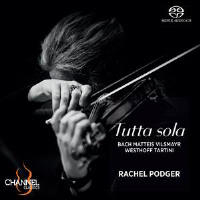Texte paru dans: / Appeared in: |
|
|
Outil de traduction |
|
|
Since making standard-setting recordings of Bach’s Sonatas and Partitas (7/99, 12/99), Rachel Podger has returned intermittently to the solo violin repertoire to explore the works that came before Bach’s epoch-making set and that may have inspired and influenced it. In this respect, ‘Tutta sola’ might be seen not only as a companion to Podger’s Bach but also as a sequel to ‘Guardian Angel’ (11/13), which also opened with a Bach transcription (the Flute Partita) and dropped in on the likes of Tartini and the younger Matteis.
The challenge for all these composers was to take a primarily soprano melody instrument and create works in which full(er) harmony is implied through techniques such as double-stopping, arpeggiation or exploiting the instrument’s range across the four strings to imply multiple lines. The great D minor Toccata attributed to Bach may conjure up in some listeners’ minds the archetype of the gothic organ played at full pelt but many have imagined a putative violin original, pensive rather than projecting; and come the fugue, the full panoply of effects is pressed into action to create a highly persuasive sort of ‘ghost’ polyphony.
Consistent beauty of tone isn’t a priority for Podger and her 1739 Pesarinius in this repertoire. In her hands the violin sings like a soprano, blares like a trumpet, spits, whispers and even wheedles like a crying child. She can be severe, for example in the angular Sarabande from the Klagenfurt Manuscript, celebratory in the fanfarelike Corelli transcription from John Walsh’s Select Preludes and Vollentarys for the Violin or the Allegro assai from the Tartini Piccola sonata, and plaintive in the same work’s central song based on a verse by Tasso. The sequence by the enigmatic Vilsmayr (a Salzburg colleague and supposed student of Biber, yet to score his own Grove biography) is more consciously melodic, with its alternating sequence of Arias and dance movements, the Matteis Fantasia more harmonically anguished, the Westhoff suite pleasingly extrovert. Notes by Mark Seow succinctly offer context for the music and portray the milieux in which these composers worked. Throughout, Podger is a perfect guide, her intonation unfailing and her musicianship and violinistic personality illuminating this intriguing music at every moment. |
|
_small.jpg)



